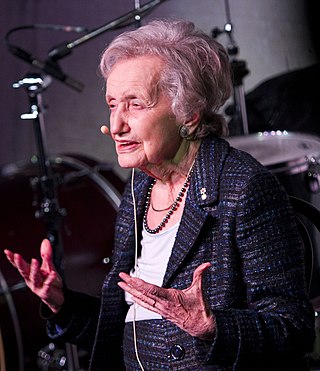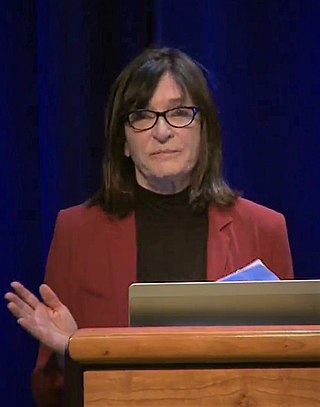
Brenda Milner is a British-Canadian neuropsychologist who has contributed extensively to the research literature on various topics in the field of clinical neuropsychology. Milner is a professor in the Department of Neurology and Neurosurgery at McGill University and a professor of Psychology at the Montreal Neurological Institute. As of 2020,she holds more than 25 honorary degrees and she continued to work in her nineties. Her current work covers many aspects of neuropsychology including her lifelong interest in the involvement of the temporal lobes in episodic memory. She is sometimes referred to as the founder of neuropsychology and has been essential in its development. She received the Balzan Prize for Cognitive Neuroscience in 2009,and the Kavli Prize in Neuroscience,together with John O'Keefe,and Marcus E. Raichle,in 2014. She turned 100 in July 2018 and at the time was still overseeing the work of researchers.
Doreen Kimura was a Canadian psychologist who was professor at the University of Western Ontario and professor emeritus at Simon Fraser University. Kimura was recognized for her contributions to the field of neuropsychology and later,her advocacy for academic freedom. She was the founding president of the Society for Academic Freedom and Scholarship.

Patricia Goldman-Rakic was an American professor of neuroscience,neurology,psychiatry and psychology at Yale University School of Medicine. She pioneered multidisciplinary research of the prefrontal cortex and working memory.

Jacqueline N. Crawley is an American behavioral neuroscientist and an expert on rodent behavioral analysis. Since July 2012,she is the Robert E. Chason Chair in Translational Research in the MIND Institute and professor of psychiatry and behavioral sciences at the University of California,Davis School of Medicine in Sacramento. Previously,from 1983–2012,she was chief of the Laboratory of Behavioral Neuroscience in the intramural program of the National Institute of Mental Health. Her translational research program focuses on testing hypotheses about the genetic causes of autism spectrum disorders and discovering treatments for the diagnostic symptoms of autism,using mouse models. She has published more than 275 peer-reviewed articles in scientific journals and 110 review articles and book chapters. According to Scopus,her works have been cited over 36,000 times,giving her an h-index of 99. She has co-edited 4 books and is the author of What's Wrong With my Mouse? Behavioral Phenotyping of Transgenic and Knockout Mice,which was very well received.
Ingrid Suzanne Johnsrude is a Canadian neuroscientist,a professor of psychology at University of Western Ontario,and was the holder of the Canada Research Chair in Cognitive Neuroscience. Her research involves brain imaging,the connections between brain structure and language ability,and the diagnosis of degenerative brain diseases in the elderly.
Barbara Jacquelyn Sahakian,is Professor of Clinical Neuropsychology at the Department of Psychiatry and Medical Research Council (MRC)/Wellcome Trust Behavioural and Clinical Neuroscience Institute,University of Cambridge. She is also an Honorary Clinical Psychologist at Addenbrooke's Hospital,Cambridge. She has an international reputation in the fields of cognitive psychopharmacology,neuroethics,neuropsychology,neuropsychiatry and neuroimaging.

Carol A. Barnes,Ph.D.,is a neuroscientist and a Regents' Professor of psychology at the University of Arizona. Since 2006,she has been the Evelyn F. McKnight Chair for Learning and Memory in Aging and is director of the Evelyn F. McKnight Brain Institute. Barnes has been president of the Society for Neuroscience and is a Fellow of the American Association for the Advancement of Science,and foreign member of the Royal Norwegian Society of Sciences and Letters. She was elected to the National Academy of Sciences in 2018.
Amy F.T. Arnsten is an American neuroscientist. She is the Albert E. Kent Professor of Neuroscience and Professor of Psychology as well as a member of the Kavli Institute of Neuroscience at Yale University.
Maria Natashini "Natasha" Rajah is a Canadian neuroscientist who is a Full Professor at the Department of Psychiatry,McGill University,and was the inaugural Director of the Cerebral Imaging Center (CIC) at the Douglas Research Centre from 2011-2021. She is a cognitive neuroscientist who is interested in episodic memory,ageing and dementia. Her research uses functional magnetic resonance imaging to investigate how sex,gender,and social determinants of health interact with age and affect the neural networks responsible for episodic memory encoding and retrieval.
Dena Dubal is the David A. Coulter Endowed Chair in Ageing and Neurodegenerative Disease at University of California,San Francisco. Dubal has demonstrated that the hormone Klotho can enhance cognition and protect the brain from neurodegenerative decline.

Michela Gallagher is an American cognitive psychologist and neuroscientist. She is the Krieger-Eisenhower Professor of Psychology and Neuroscience at Johns Hopkins University. Her scientific work has changed the model of neurocognitive aging,and developed new indices for its study. Previously,work had focused on neurodegeneration as a primary cause of memory loss.

Sheena Josselyn is a Canadian neuroscientist and a full professor of psychology and physiology at Hospital for Sick Children and The University of Toronto. Josselyn studies the neural basis of memory,specifically how the brain forms and stores memories in rodent models. She has made critical contributions to the field of Neuronal Memory Allocation and the study of engrams.
Liisa Ann Margaret Galea is a Canadian neuroscientist who is a professor of psychology at the University of British Columbia. She is a member of the Centre for Brain Health and Director of the Graduate Programme in Neuroscience. Her research considers the impact of hormones on brain health and behaviour.

Scott A. Small is an American neurologist and neuroscientist known for his work in Alzheimer's disease and normal cognitive aging. His research focuses on the hippocampus,a circuit in the brain targeted by Alzheimer's disease,aging,and schizophrenia. Small is the Director of the Alzheimer's Disease Research Center at Columbia University,where he is the Boris and Rose Katz Professor of Neurology. He is also appointed in Radiology and in Psychiatry,where he directs the Schizophrenia Research program.
Erika A. Chamberlain is a Canadian legal scholar. In 2017,Chamberlain was appointed to a five-year term as Dean of the University of Western Ontario Faculty of Law as a replacement for Iain Scott. Her research focuses on the field of impaired driving law and alcohol-related civil liability.

Jessica Adrienne Grahn is an American music neuroscientist. She is the director of the Human Cognitive and Sensorimotor Core of the University of Western Ontario's Brain and Mind Institute. During the COVID-19 pandemic,Grahn was named to the Royal Society of Canada's College of New Scholars,Artists and Scientists.
Rachelle Smith Doody is an American neurologist and neuroscientist. She is known for her work on late stage development of drugs for Alzheimer’s disease,Parkinson’s disease,Huntington’s disease and other neurodegenerative disorders.

Lucina Q. Uddin is an American cognitive neuroscientist who is a professor at the University of California,Los Angeles. Her research investigates the relationship between brain connectivity and cognition in typical and atypical development using network neuroscience approaches.

Ravi Shankar Menon is a Canadian-American biophysicist. He is a former Tier 1 Canada Research Chair in Functional Magnetic Resonance Imaging at the University of Western Ontario and director of the Centre for Functional and Metabolic Mapping at the Robarts Research Institute.










